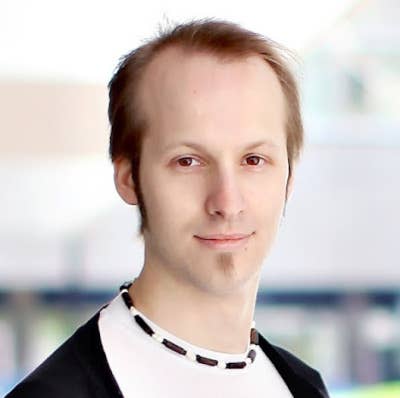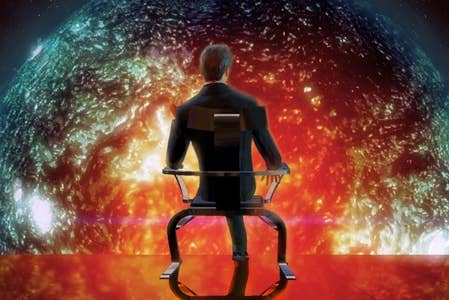BioWare: "We haven't had a breakthrough success"
Dorian Kieken on where BioWare differs from Blizzard and Valve, and the changing relationship with its fans
For longstanding fans of Bioware, this console generation has been decidedly ambiguous. On the surface, at least, the Canadian RPG specilialist is a very different beast to the studio that created the Baldur's Gate and Neverwinter Nights franchises: bigger, wealthier, and seemingly more focused on hitting the widest possible audience with every new release. For some, the BioWare of 2012 is the most vital developer in the industry; for others, it is a diluted version of a vintage that reached its peak in 2001.
As development director of Bioware's Montreal studio, Dorian Kieken is never going to agree with the sceptics, but he cannot deny that certain aspects of the company have changed immeasurably - and very much for the better. The days when a game as significant as Knights Of The Old Republic would ship after two delays and a year behind schedule are gone. BioWare's creative prowess is as potent as ever, but it is now also a well oiled and highly efficient machine.
"For Bioware, originally, making the game was just about the people making the game, and that has a lot of merit - I have a lot of belief in team self-organisation," he says. "But it was to such an extreme that the games were not very well organised in a lot of ways. The first Mass Effect took five years to make and had one production person for most of the project, and a second by the very end. Mass Effect 2 had twelve or thirteen production people."
"The first Mass Effect took five years to make and had one production person for most of the project. Mass Effect 2 had twelve or thirteen"
Kieken joined Bioware in September 2007, right on the brink of a new era for the company: the following month, Electronic Arts' acquisition was officially announced; the month after that, Mass Effect was released. Since then, BioWare has reached new heights of commercial success, becoming so vital to EA's plans that, in 2011, it was installed as one of the publisher's four core "labels". According to Kieken, the company's current status has granted it unprecedented control over its products, and the only proof that EA requires is the number on the bottom line.
"For the very first time we have control of things that we've never had control of before, things like marketing. Marketing used to be a department we were always negotiating with, but that is part of our group now," he says.
"Ultimately, EA comes to the BioWare boardroom and says. 'Here is the amount of money you have, and here is the amount of money you need to generate in X years. The way you do it is your problem.' So the growth of Bioware Montreal is in the context of the other Bioware studios. It's because we're successful with the Mass Effect series that we can grow a studio. It's all within the Bioware label strategy.
"[The trust] is something very new... I have a lot of respect for John Riccitiello. He is trying to move the company towards a vision that is very smart, with a sort of city-state culture. Basically, you're accountable only to generate revenue. I like that relationship of responsibility."

And BioWare takes that responsibility seriously. The autonomy the company enjoys is enviable and all too rare, but its arrangement with EA is designed around success. Every penny the company spends needs to be justified by the revenue it returns, and unlike some of its peers from back in the days of Baldur's Gate, BioWare has no guarantee of financial stability.
"In Bioware we need to have that level of discipline," he says. "Don't get me wrong, our games are doing well, but we didn't have a crazy breakthrough success that saved us from not being organised, like Valve and Blizzard did.
"Valve, Blizzard and Bioware all had a very similar profile over a decade ago: they were all doing very high quality games that people appreciated a lot, but at a huge cost and really not selling that much. Before World of Warcraft, Blizzard as a company really wasn't doing well. They were very expensive, and their revenue didn't match how expensive they were. Valve, before the huge success of Steam, really wasn't doing well financially either.
"They had the sort of breakthroughs that allowed them not to worry about money any more - they still do, of course, but to a lesser extent. We don't have that yet at Bioware. If we have two games in a row, as expensive as we are, that don't do well at all... we need to be careful."
Ultimately, this uncertainty has created an internal culture built upon pushing at its own limitations. In the last few years BioWare has developed and launched an MMO, implemented a cross-platform strategy encompassing mobile games and social networks, and, with Mass Effect 3, made its first attempt at an online multiplayer mode. These are experiments and learning experiences, some more successful than others, but if BioWare is to keep refining its core competency of making high-end RPGs it needs to mitigate risk by expanding its business in other directions.
"We didn't have a crazy breakthrough success that saved us from not being organised, like Valve and Blizzard did"
However, while such experiments help to improve the future stability of the company, they also seem to inform the growing feeling of dissent in its core fan-base. From Mass Effect 2's stripped down mechanics to Dragon Age 2's static location to Mass Effect 3's controversial ending, the notion that BioWare has somehow lost touch with its roots has been on the rise. And with the company still reliant on each new product being successful it cannot afford to ignore what its fans are saying, however reactionary that might be.
That's why the Dragon Age 3 team turned to the BioWare forums to ask what the fans wanted from the finished game. That's why you will soon be able to play free DLC that alters the ending of Mass Effect 3. And Kieken refutes the idea that either is evidence of BioWare simply pandering to the vocal minority and undermining its creative vision. Rather, he sees it is an indication of BioWare's greater respect for the relationship between games and their players, and its growing skill for finding and filtering balanced criticism.
"If someone gives a well thought out criticism, something that is tangible, those are the people that we try to reward as much as possible. And we want to reward them, because that feedback is how we make better games," he says. "On the opposite side, opinion that is too emotional, we won't reward that in the same way. The more you put that as your philosophy, the more you start to have a culture where people are trying to be more analytical with their feedback.
"Fan feedback and fan reaction has always been really important top us when doing our games, so taking the stance that this is our art is something that Bioware has never done in the past anyway. The further you go into listening to criticism and how you should change, and you take that to its extreme, you will start to lose your vision and your integrity. But we're not taking that road.
"I believe in a balanced approach. It's a fine line with dangers on one side or the other, but it's the healthy one. And I think it's representative of what gaming is. It's not a two-hour art-form that's imposed upon you. It's interactive, so you're going to have your say on it."

